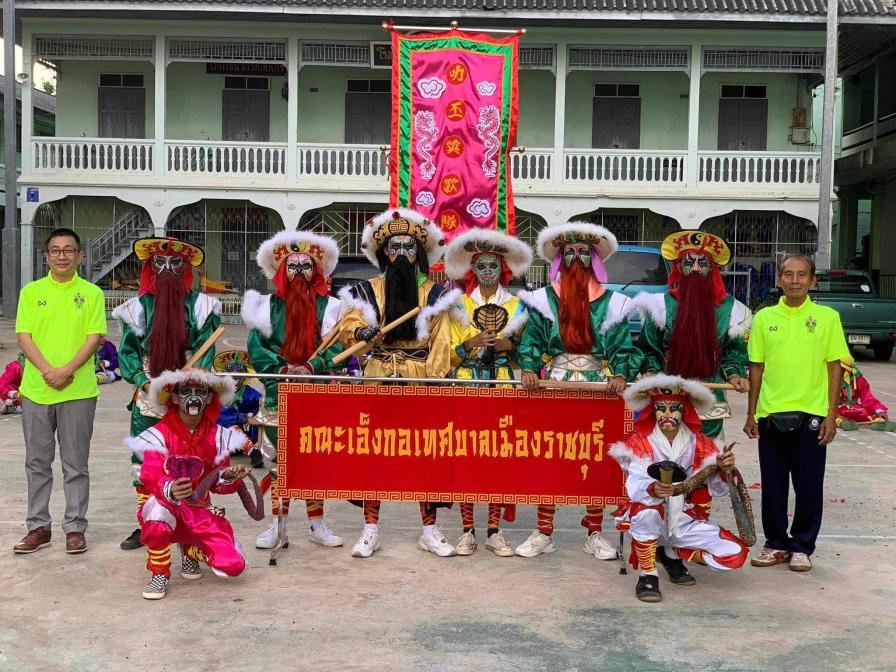The Chaoshan region in South China’s Guangdong Province, known as the birthplace of Yingge, a traditional Chinese folk dance, recently welcomed a unique cultural exchange delegation from Thailand. This visit symbolizes the flourishing relationship between the two countries, especially in the realm of cultural heritage.
A century ago, Yingge was introduced to Thailand by Chinese migrants, where it has since thrived and spread across more than ten provinces. Today, practitioners of Yingge in Thailand, supported by both the Chinese and Thai governments, are returning to its roots in China to deepen their understanding and connection to the dance.
Led by the mayor, the Thai delegation comprised 39 individuals from diverse backgrounds, including charity workers, businesspeople, Yingge coaches, performers, and school teachers. Wei Xiuqian, principal of Wenyi Public School in Phanat Nikhom, Chonburi Province, shared that the group ranged in age from 16 to over 70. Their itinerary included interactions with local schools and Yingge teams in Shantou and Puning, as well as joint performances with Chinese practitioners.
Deng Yao, a scholar dedicated to Guangdong’s intangible cultural heritage, played a pivotal role in these exchanges. In June 2023, Deng brought members of the Puning Fumei Youth Yingge Team to Thailand, fostering connections with Yingge teams in Chonburi and Udon Thani. This initiative led to further exchanges, including a visit by the Shantou Cultural Exchange Delegation to Thailand in July, where both sides expressed a desire for ongoing mutual visits.
The significance of Yingge in Thailand is deeply rooted. The dance was formally introduced in Phanat Nikhom during the Mid-Autumn Festival of 1942. Over the years, Yingge has become a staple in Chinese New Year and Mid-Autumn Festival celebrations, especially in provinces with large Chinese communities. Today, Yingge has permeated throughout Thailand, notably in Chonburi, Nakhon Pathom, and Udon Thani Provinces.
The evolution of Thai Yingge mirrors the changing times. Deng experienced this firsthand during the 2023 Mid-Autumn Festival in Thailand, where the celebration included not just traditional Chinese elements like incense cases, gongs, and lion dances, but also Thai and Western music, creating a truly international festival atmosphere.
Yingge’s popularity was evident during these festivities. The presence of multiple Yingge teams, including those from local schools, highlighted the dance’s widespread appeal and its role in bridging cultures.
Beyond cultural celebrations, Yingge has become a tool for economic revival. In Phanat Nikhom, weekend outdoor Yingge performances have been attracting tourists since November, boosting local consumption. The county has also developed a Yingge Culture Experience One-day Tour to further promote tourism. Udon Thani Province even hosted a Yingge Marathon Fun Race on October 1, drawing in residents and tourists alike.
Deng’s research in 2022, which included special trips to Chonburi and Udon Thani, revealed the profound impact of Yingge on the lives of those who practice and cherish it. The spread of Yingge back to its Chinese origins has piqued the interest of Chaoshan Yingge enthusiasts and awakened the nostalgia and longing of Thai Chinese and young people passionate about the dance.
This cultural exchange highlights the enduring ties between Thailand and China, showcasing how traditional art forms like Yingge can transcend borders, fostering a shared sense of heritage and community. The Yingge delegation’s visit to China not only celebrates a shared cultural past but also paves the way for future collaboration and understanding between these two nations.
READ MORE:
